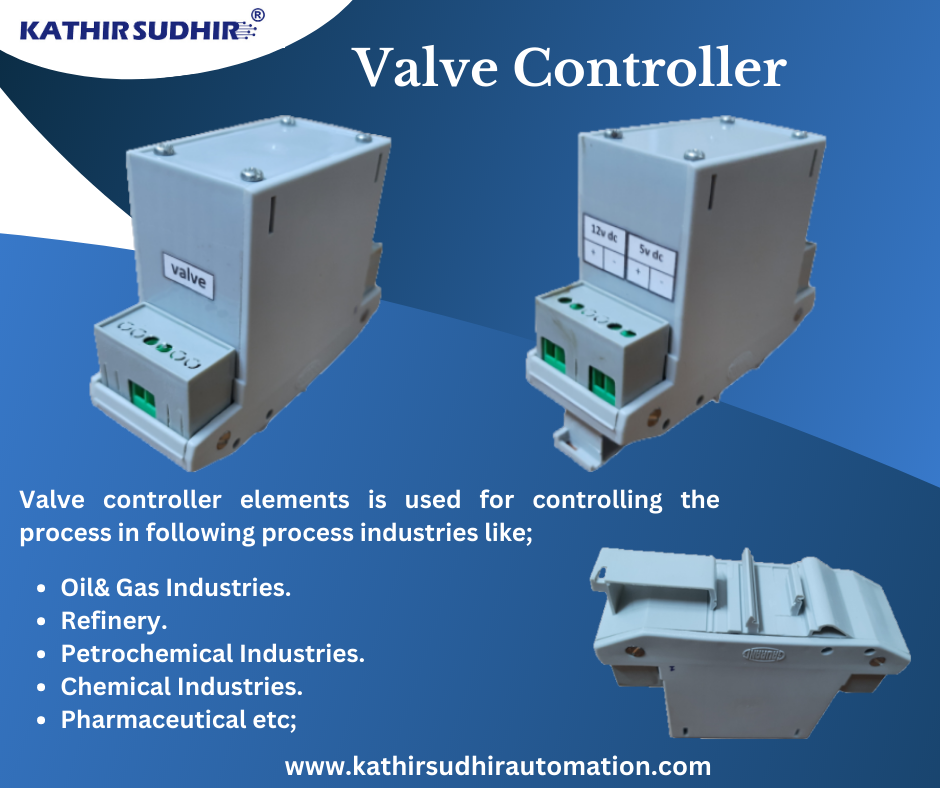Introduction : In the complex landscape of process industries, efficient control and management of valves play a crucial role. Valve controllers serve as indispensable elements that enable precise regulation and automation of fluid flows. These sophisticated devices find extensive application in industries such as oil and gas, refineries, petrochemicals, chemicals, pharmaceuticals, and more. In this blog post, we will explore the significance of valve controllers in these diverse sectors, emphasizing their role in enhancing safety, optimizing operations, and improving overall productivity.
Oil and Gas Industries
In the oil and gas sector, valve controllers are vital for maintaining flow rates, pressure, and temperature within predetermined limits. Whether it’s controlling the flow of crude oil during extraction, regulating gas flow in pipelines, or managing process variables in refineries, valve controllers ensure smooth and safe operations. These devices help prevent leaks, overflows, or system failures, minimizing downtime and maximizing productivity.
Refineries
Valve controllers find extensive application in refineries, where they play a critical role in managing complex processes. Refineries require precise control of fluid flows, pressures, and temperatures during various refining stages. Valve controllers are responsible for automating the opening, closing, and adjustment of valves to maintain optimal conditions throughout the refining process. By achieving accurate control, these devices contribute to efficient production, enhanced safety, and reduced energy consumption.
Petrochemical Industries
Petrochemical industries involve the production of chemicals derived from petroleum or natural gas. Valve controllers are integral to these processes, ensuring precise control over the movement of fluids and gases. These controllers aid in managing reaction rates, temperature, pressure, and composition, allowing manufacturers to maintain consistent product quality and optimize the production cycle. By automating valve operations, valve controllers enhance safety by minimizing the risk of human error and potential hazardous incidents.
Chemical Industries
Valve controllers also play a significant role in chemical industries, which encompass a wide range of manufacturing processes. These industries rely on accurate control of valves to maintain optimal conditions for chemical reactions, mixing, and separation processes. Valve controllers enable precise regulation of flow rates, pressure, and temperature, ensuring product consistency, minimizing waste, and improving overall efficiency. Furthermore, in industries where hazardous substances are handled, valve controllers contribute to safety by enabling remote operation and monitoring.
Pharmaceutical Industries
In the pharmaceutical sector, stringent quality control and adherence to precise specifications are of paramount importance. Valve controllers aid in maintaining the integrity of processes by ensuring accurate dosage control, sterilization, and mixing of ingredients. These devices provide precise regulation of flow rates, pressures, and temperatures, supporting consistent production of medications and adherence to regulatory standards. Valve controllers also contribute to the automation of pharmaceutical processes, reducing human intervention and potential contamination risks.


Conclusion
Valve controllers serve as essential components in various process industries, including oil and gas, refineries, petrochemicals, chemicals, and pharmaceuticals. Their ability to regulate fluid flows, pressures, and temperatures with precision offers numerous benefits. By ensuring optimal process control, valve controllers enhance safety, reduce downtime, optimize operations, and improve overall productivity. As industries continue to evolve, the importance of valve controllers in streamlining processes and achieving operational excellence remains unwavering.
Whether it’s maintaining the flow of oil in pipelines or controlling chemical reactions, valve controllers have proven to be invaluable tools. As technology advances, we can expect further innovations in valve controller designs, enabling even greater efficiency and integration with advanced process control systems. Embracing the power of valve controllers will undoubtedly continue to be a key focus for industries seeking to achieve optimal performance and maximize their competitive edge.

